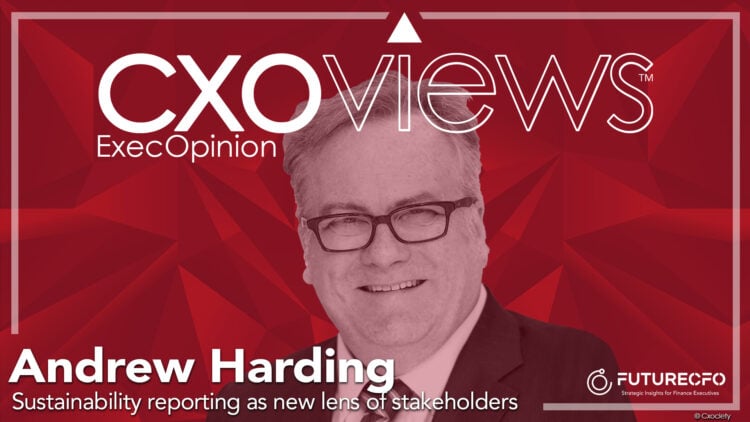Indeed, there are many issues and priorities that are high on the agenda of the Board and C-suite in 2024, including environmental, social, and governance (ESG) factors, and sustainability which have become essential in the business world.
A discussion with EY's Bruno Sarda and Terence Jeyararetnam highlighted the emerging need and expectations for the chief financial executive to play a key role in ESG, while a recent joint study by the Association of Chartered Certified Accountants and the Chartered Accountants Australia and New Zealand poked at the relevance of sustainability reporting in talent attraction and retention within the finance function.
It is then an undeniable fact that CFOs must face matters on sustainability and dedicate ample time to understand the importance of sustainability reporting to harness potential benefits in operations and decision-making procedures.
Andrew Harding, FCMA, CGMA, Chief Executive of Management Accounting at AICPA & CIMA, together as the Association of International Certified Professional Accountants, believes the integration of material sustainability information into the finance function's main corporate report is fast becoming one of the lenses through which organisations are being judged by investors, regulators, employees, and a multitude of other stakeholders.
A pivotal role
"As core members of almost every business and non-governmental organisation, accounting and finance professionals have a pivotal role in providing sustainability-related financial and financial management information to drive business performance, develop strategies, and influence decision-making."
Harding thinks accounting and finance professionals own the processes, systems, data, management information, reporting, and assurance that will support their organisations’ transitions to sustainable business models, bringing a unique set of skills and knowledge to the table.
Additionally, the finance team can work with stakeholders to integrate responsible and sustainable practices into their business and operating models.

"Without the rigour and business acumen of accounting and finance professionals, it may prove impossible to truly embed sustainability into 'business as usual,'" Harding says. "The profession’s very nature makes it a powerful force for supporting and implementing strategies and programmes aligned to organisational goals and long-term value creation, and assuring this information and the systems."
Ethical dilemmas
In dealing with ethical dilemmas in sustainability reporting, it is important to note how accountants sit at the heart of business and economies.
"For economies to thrive, the adoption of good business practice, a strong accounting profession and adherence to law and ethical standards is essential," says Harding. "Without it, investment falters and opportunities are lost."
He notes that trust is the keystone of the accounting and finance profession, with discipline, ethical integrity, and collaboration as shared values and important tenets of this trust.
"Within the profession, we must seek to uphold the highest professional, ethics and integrity standards and apply them throughout our working lives. At every job and level."
"In every community, and country, we are each accountable to upholding this trust through serving the public interest, instilling confidence in world economies and leading by example in every business and organisation."
Harding adds that with the growing strategic importance of the accounting and finance profession in every type of organisation, it is essential that the profession continues to uphold the highest ethical standards to guide organisations to do business responsibly.
"We have an individual and collective responsibility to embed this rigour and professionalism within our teams and organisations, especially in unpredictable business environments."
A good sustainability report
For Harding a good sustainability report should have the following characteristics:
+ Comply with reporting standards and frameworks to ensure consistency and provide all stakeholders with consistent, comparable information on a variety of metrics, including sustainability metrics.
+ Be data-driven with reliable information, which follows existing control procedures and processes, with appropriate detail that reflects the company’s goals and external stakeholder reporting needs.
+ Provides investors and other stakeholders with decision-useful information to support sustainable asset and resource allocation.
+ Include meaningful, transparent, and auditable data that is clearly defined, internally and externally relevant, and measurable in line with the organisation’s mission, values, and goals.
+ Be comprehensive giving a comprehensive overview of an organisation’s performance and prospects, including both key achievements and areas for improvement.
Expectations in 2024
Harding concedes that 2024 remains uncharted territory for businesses, however, he is convinced accounting and finance professionals wil continue to help their organisations navigate disruption and enhance their resilience.
He highlights his view on what to expect for finance professionals for the year:
Digital transformation
Finance teams have a bigger role to play in infrastructure adaptation, automation, and data due to their roles at the centre of the strategic-planning process, stakeholder management, and financial disciplines. When it comes to skills and competencies, they need to be adaptable and embrace technology, seek new opportunities to create value by taking a data-driven approach, and promote cross-functional collaboration.
Environmental, Social and Governance (ESG) matters
Organisational performance is no longer being judged purely on short-term financial returns to shareholders. As a result, the mandate of the finance team is rapidly expanding to help better define, enable, and articulate how their organisation creates and preserves value over time for stakeholders.
Finance business partnering
Finance teams must now plant themselves within the business, speak its language, and provide strategic support to colleagues across their organisation in a way that enables agility and creates value. Successful finance business partnering requires accounting and finance professionals demonstrate a combination of accounting, business management and soft skills, which they will need to continue developing in the next 12 months.




